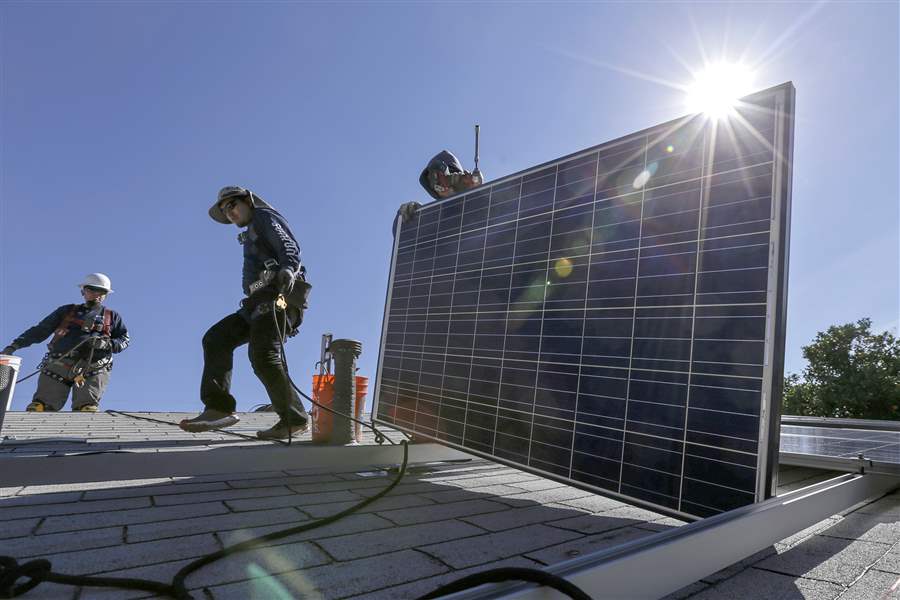
Home-improvement financing program under scrutiny
Some say misleading information causing foreclosures
6/18/2017
Workers install solar panels on a roof in Los Angeles in February, 2016. Lawmakers and lenders are weighing consumer protections for PACE loans, which pay for energy-efficient home improvements, after some borrowers said they didn't understand what they were agreeing to.
Irfan Khan/Los Angeles Times
LOS ANGELES — After nearly half a century at the house on South Sierra Bonita Avenue in Los Angeles, Ossie Hill wanted to spruce up the two-bedroom home she and her late husband purchased in the early 1970s.
But the 86-year-old didn’t have the money.

Ossie Hill, 86, right, cries over the possibility of foreclosure of her Los Angeles home as her daughter Cassina Edwards, 59, looks on. Hill is facing annual payments of $5,500 for a roughly $50,000 loan through the PACE program.
Then her daughter, Cassina Edwards, had an idea, recalling radio ads for a local home-improvement contractor: “We can help you. Low income. No credit check. Government program. Give us a call.”
So Ms. Edwards did.
Now her mother, who receives $11,600 a year from Social Security and suffers from dementia, is struggling with a roughly $50,000 loan paid through a $5,500 annual tax assessment — an increasingly popular form of home-improvement financing known as PACE.
Ms. Edwards said the contractor explained that “a government program” would help the octogenarian afford the improvements, but never explained how the payments would work, or warned them Ms. Hill could lose her house if payments were missed.
“I want my mother to keep her home. This is all she has,” Ms. Edwards said on a recent afternoon as Ms. Hill sat next to her, eyes closed, head rested on her cane. “It’s pretty sad that they prey on people for your lack of knowledge. If you came in and were truthful about it, this would have never happened.”
Consumer groups, regulators, and lawmakers are raising concerns about Property Assessed Clean Energy loan programs, which are authorized by governments but largely administered and funded by private lenders. In particular, the focus is on independent solar, plumbing, and roofing contractors who pitch the loans and sign up consumers through online software — a system that’s drawn scrutiny but helped the industry grow aggressively.
The total amount lent for residential PACE projects topped $1.5 billion in 2016, up from $350 million just two years earlier, according to trade group PACENation.
The loan programs are meant to serve a public good — allowing more people to finance solar and other energy-efficiency projects.
The loans are secured by a property lien and, if unpaid, a borrower can be foreclosed upon. Consumers put no money down and usually don’t pay anything for at least six months. Eligibility is largely based on home equity. Credit score and income are not a factor.
Many consumers simply know their loans as the HERO program, the name of the PACE program from the industry’s biggest lender, Renovate America in San Diego.
Critics say PACE can serve a worthy purpose, but worry too many consumers are agreeing to loans they don’t need or understand after being contacted by aggressive contractors, who often make cold calls or engage in door-to-door marketing.
“They go out and push these sales and these projects without really any care whether people can actually afford it or not,” said David Hiller, a Pasadena, Calif., attorney who has handled PACE cases for consumers.
“It feels exactly like what was going on with mortgage lending pre-crisis.”
The three major private lenders — Renovate America, Renew Financial of Oakland, and Ygrene Energy Fund of Petaluma, Calif. — say most of their customers come away happy and point to low default and delinquency rates as evidence the programs are working.
“We have had homeowners in tears” after they finally could finance repairs, Cisco DeVries, the chief executive of Renew Financial said. “Any public policy, any private effort, by nature is going to be imperfect. But PACE has to be one of the most successful energy-efficiency programs in the history of the state and the country.”
A more typical experience, proponents say, is that of Lorri MacMillan, who last year used a $14,000 HERO to buy air conditioning. The Rancho Santa Margarita resident said her contractor didn’t misrepresent anything and Renovate went over terms in detail — something the firm said it began doing for every customer in recent months.
PACE programs got their start in 2008 when Gov. Arnold Schwarzenegger signed legislation that authorized the special type of financing.
To fund the programs, governments issue bonds backed by the borrower tax assessments and then typically transfer collection rights to private PACE companies. The firms take those assessment bonds and compile them into securities and sell them on Wall Street to finance new loans.
Across the U.S., less than 1 percent of all securitized PACE loans that Kroll Bond Rating Agency tracks have defaulted, said Cecil Smart, senior director at the company.
Renovate America said over the past five years, none of its clients have been foreclosed on for not paying their PACE loan, but nearly 80 homeowners with such financing, or 0.08 percent of the total, have been foreclosed upon after they didn’t pay their mortgage.
Christian Guzman hasn’t defaulted on his PACE loan, but is struggling after a contractor walked through his L.A.-area neighborhood two years ago and asked if he wanted a free estimate to fix his roof.
A few days later, Mr. Guzman said the contractor from All American Design in Torrance, Calif., told him he qualified for more than $46,000 in HERO financing to cover a new roof and solar panels. Mr. Guzman said he agreed to both and signed documents on a tablet after being told him a government grant would cover the $26,000 roof.
He recalled the tablet showing he would only pay around $20,000 total, but acknowledged he didn’t get a good look. “He held on to it pretty well. We saw only what he wanted us to see,” Mr. Guzman said.
After the job was done, he got a payment schedule from Renovate that said he owed over $12,000 annually for five years and learned there was no government grant.
“I honestly don’t know how I am going to do this,” he said. “It’s an extra $1,000 a month I don’t have.”
All American Design did not respond to requests for comment. Renovate said it has kicked All American out of its program because the firm didn’t meet standards under a new contractor rating system.